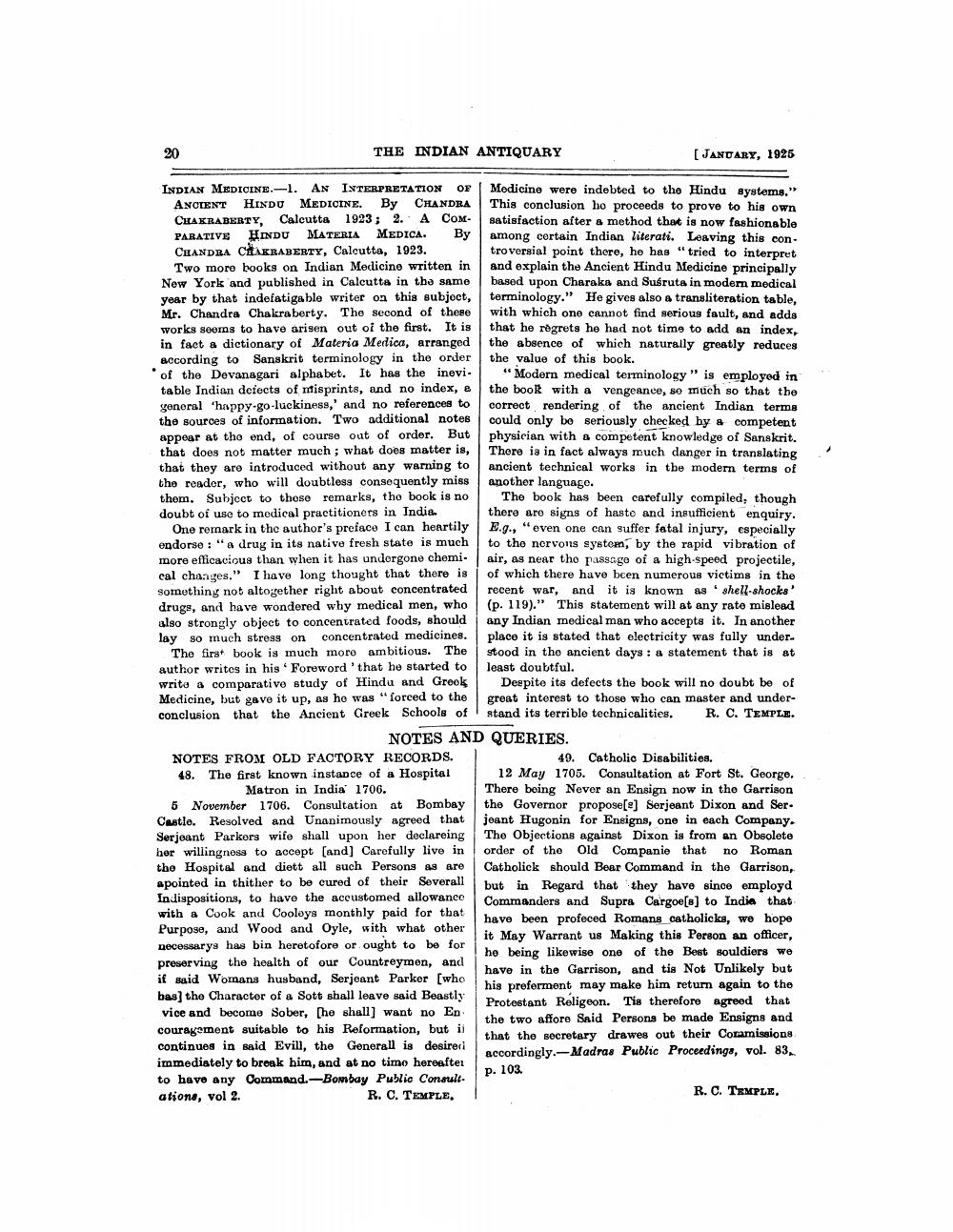________________
20
THE INDIAN ANTIQUARY
[JANUARY, 1925
INDIAN MEDICINE.I. AN INTERPRETATION OF Medicine were indebted to the Hindu systems." ANCIENT HINDU MEDICINE. By CHANDRA This conclusion ho proceeds to prove to his own CHAKELABERTY. Calcutta 1923; 2. A COM satisfaction after & method that is now fashionable PARATIVE HINDU MATERIA MEDICA. By among certain Indian literati. Leaving this conCHANDRA CHAKRABERTY, Calcutta, 1923.
troversial point there, he has "tried to interpret Two more books on Indian Medicino written in and explain the Ancient Hindu Medicine principally New York and published in Calcutta in the same based upon Charaka and Suśruta in modern medical year by that indefatigable writer on this subject, terminology." He gives also a transliteration table, Mr. Chandra Chakraberty. The second of these with which one cannot find serious fault, and adda works seems to have arisen out oi the first. It is that he regrets he had not time to add an index, in fact a dictionary of Materia Medica, arranged the absence of which naturally greatly reduces according to Sanskrit terminology in the order the value of this book. of the Devanagari alphabet. It has the inevi. "Modern medical terminology" is employed in table Indian defects of ntisprints, and no index, & the book with a vengeance, so much so that the general 'happy-go-luckiness,' and no references to correct rendering of the ancient Indian terms the sources of information. Two additional notes could only be seriously checked by a competent appear at the end, of course out of order. But physician with a competent knowledge of Sanskrit. that does not matter much; what does matter is, There is in fact always much danger in translating that they are introduced without any warning to ancient technical works in the modern terms of the reader, who will doubtless consequently miss another language. them. Subjcct to those remarks, the book is no The book has been carefully compiled, though doubt of use to medical practitioners in India there are signs of haste and insufficient enquiry.
One rernark in the author's preface I can heartily E.g., "oven one can suffer fatal injury, especially endorso: "a drug in its native fresh state is much to the nervons system, by the rapid vibration of more efficacious than when it has undergone chemi- air, as near tho passago of a high-speed projectile, cal changes." I have long thought that there is of which there have been numerous victims in the something not altogether right about concentrated recent war, and it is known as 'shell-shocks' drugs, and have wondered why medical men, who (p. 119)." This statement will at any rato mislead also strongly object to concentrated foods, should any Indian medical man who accepts it. In another lay 80 much stress on concentrated medicines. place it is stated that electricity was fully under
The first book is much more ambitious. The stood in the ancient days : a statement that is at author writes in his 'Foreword 'that he started to least doubtful. writo a comparative study of Hindu and Greek Deepite its defects the book will no doubt be of Medicine, but gave it up, as he was " forced to the great interest to those who can master and underconclusion that the Ancient Greek Schools of stand its terrible technicalities. R. C. TEMPLE.
NOTES AND QUERIES. NOTES FROM OLD FACTORY RECORDS.
49. Catholic Disabilities. 48. The first known instance of a Hospital 12 May 1705. Consultation at Fort St. George. Matron in India 1706.
There boing Never an Ensign now in the Garrison 5 November 1706. Consultation at Bombay the Governor propose[2] Serjeant Dixon and Ser. Castle. Resolved and Unanimously agreed that joant Hugonin for Ensigns, one in each company. Serjeant Parkors wife shall upon her declareing The Objections against Dixon is from an Obsolete her willingness to accept (and) Carefully live in order of the Old Companie that no Roman the Hospital and diett all such Persons as are Catholick should Bear Command in the Garrison, apointed in thither to be cured of their Soverall
but in Regard that they have since employd Indispositions, to have the accustomed allowance
Commanders and Supra Cargoe[s] to India that with a Cook and Cooloys monthly paid for that
have been profeced Romans catholicks, we hope Purpose, and Wood and Oyle, with what other
it May Warrant us Making this Person an officer, necessarya has bin heretofore or ought to be for
ho being likewise one of the Best souldiers we preserving the health of our Countreymon, and
have in the Garrison, and tis Not Unlikely but if said Womans husband, Serjeant Parker (who
his preferment may make him return again to the bas) the Character of a Sott shall leave said Beastly
Protestant Religeon. Tis therefore agreed that vice and become Sober, the shall] want no En
the two affore Said Persons be made Ensigns and couragement suitable to his Reformation, but it
that the secretary drawes out their Commissions continues in said Evill, the Generall is desireri
accordingly.-Madras Public Proceedings, vol. 83 immediately to broak him, and at no time hereafter
p. 103 to have any Command.-Bombay Public Consult. ations, vol 2. R. C. TEMPLE.
R.C. TEMPLE.




